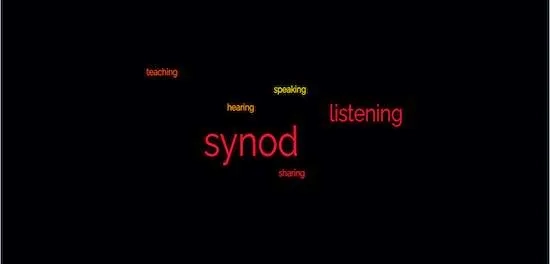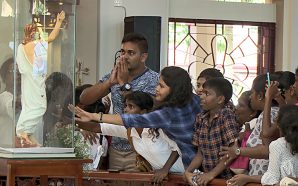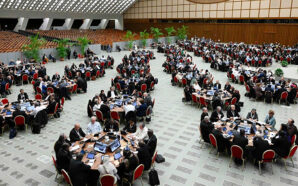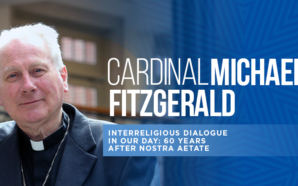Over the past three years I have been speaking to many groups about the notion of synodality and what it might mean (and not mean) for that community of disciples we refer to as the Catholic Church. In the discussions, one question is invariably put to me, and it amounts to this: If you were going to be at the upcoming Synod assembly what would be your Number 1 ask?
The question is an obvious one: many of those interested in the Synod belong to groups who are calling for renewal within the Church, and very many of them are still seeking to bring the vision of Vatican Council II (1962-65) to fruition through specific changes and reforms. But if the question is obvious, that does not mean that answer is.
You, me, and every other Catholic could draw up a wish list of “changes we would like to see”, but would such a list appropriate? Come to think of it, even Pope Francis could draw up such a list – I’m sure that abolishing clericalism, finding new ways of standing up for the poor and for the creation, and some way to repair the hurt and damage caused by sexual abuse by clergy would be on it – but that list too might be a short-circuiting of the very basis of a Synod assembly.
Synod assemblies are supposed to be places of listening
At the heart of the notion of synodality is that people from different places, coming together bring different views, perspectives and insights. Each has to be listened to, taken into account, and valued. Traditionally, this has meant bishops listening to bishops – and, clearly, this is one of the problems when synodality is to become a characteristic of the Church. There need to be many other perspectives than those of celibate, older men who all have a common profession with a highly defined esprit de corps. A start has been made with having some others of the baptized being at the Synod assemblies and allowing them to vote, but if this next assembly is to usher in synodality to the Catholic Church, this is just the tip of an iceberg.
Only when a genuine culture of listening is in place, can one start to think about various wish lists for change.
But why is listening so important? Because the opposite of listening is a top-down approach where all knowledge, guidance, and wisdom is held by a group of leaders, or even just one man, and this is then dispensed to everyone else. The vision of the Catholic Church put forward by Pius IX (who was pope from 1846-78) and his successors – a model that is still very much in place – is the antithesis of a synodal Church.
The older model was one of a two-tier Church of teachers (the ecclesia docens) and obedient listeners (the ecclesia discens). The synodal Church assumes that all speak and all listen. They do this in terms of their common dignity as human beings created in God’s likeness, in terms of their common baptism that makes them members of the Christ, and in terms of their common task as disciples moving along the Way.
We do not yet know how to do this – the consultation processes have been very patchy and clunky – but we have made a start. Only one thing seems certain: the period from October 2023 to October 2024 is going to be a steep learning curve, it is going to be painful, but it will be a time of real growth. Also, let us be realistic, it will meet stiff resistance not just from Roman Curia officials who have a personal interest in the status quo, but from those looking for simple, black/white answers to complex questions, and from those who use religion – and a certain type of Catholicism in particular, as one more front for their social and economic agenda. Alas, authoritarianism survives because it is convenient for so many!
The key questions: where are we now and where should we be going?
So what are they listening for? It is not a case that they are listening out for some voice from heaven or that there is a secret key that could unlock some wondrous source of wisdom. There have been many times in Christian history when groups have claimed that they had just such a treasure with all the answers. Some claim that they have it in a sacred book such as the scriptures, or in replicating yesterday and claiming that is “tradition”, or in an individual such as the pope, or even some private revelation (e.g. “the secret message” of Fatima). But synodal listening is far more mundane and requires much more thinking, prayer, and discerning.
The focus is on where are we, as the People of God, now? What are the demands of discipleship that we face in our time and culture, and what is the best way to face these challenges. Moreover, we are a people on the move: we are called to walk and act as disciples, not simply sign up to an abstract list of beliefs. Hence, a second question, where should we be going? How should we be witnessing to God’s love manifest in his Anointed One? What should we be doing that we are not doing?
Answering these questions will throw up a whole raft of changes that we have to make if we are to move forward: that is the wish list. And once we know where we should be going, if the Synod does not act on these, then it will be a failure. One does not listen just to get information. One also listens to see what has to be done now. Then one prays for the courage to make the changes in the face of those who oppose change. The true wish list can only emerge from the listening.
What would you say?
If presenting a “wish list” is not the first step for a Synod, that does not mean that there is not something I would like to say to the assembly were I there.
Synod assemblies have often failed to really solve problems they’ve decided to tackler for this reason: facing the need to change would mean acknowledging that the Church had made mistakes in the past.
In 1415, at the Council of Constance, the Church did not face up to the questions posed to it by Jan Hus (c.1369–6 July 1415) – instead they condemned him and handed him to the civil power who murdered him by burning at the stake. If that council had admitted that certain errors had crept into the liturgy and remedied them, the festering problems that lead to the Reformation – and the division of the Western Church – might have been avoided.
It was only in the 1950s that scholars looked again at Hus’s writings and realized that he was not guilty of the heresies of which he was accused, and for which is was murdered. Alas, many places in the Catholic Church still have not responded to problems pointed out by Hus – despite Vatican II addressing them. But Vatican II did not admit that there was a defective tradition, due to mistakes; so by its not admitting that any mistake had ever been made, many bishops’ conferences did not realize that the changes were actually important and not just “window dressing”.
At the Council of Trent (1545-63), the fear that if they admitted Martin Luther might have made many correct challenges to the Church meant that rather than learning from his criticism, and that of others, they swung to the other extreme. So fearful were they that if they admitted that Luther was right on anything, they rejected even the obvious reforms. The effect was that the indefensible was, in many cases, made the norm. Moreover, this policy served to embed division and warfare over religion into the heart of European society. We are still paying the cost. Again, many of these were put right by Vatican II – but again no one “put their hands up” and said “we got it wrong”. The myth that the Church is perfect, that it does not make mistakes, and that “everything it has ever said is consistent with everything else” won the day!
Then at Vatican Council II a somewhat similar situation arose. The bishops privately knew that mistakes had to be corrected, but once more they made changes without explaining that they proposed these as remedies. The result was the conundrum of saying: the new way is better, but there is nothing wrong with the old way! The result has been people scratching their heads as to why the changes were made; while others engage in culture wars within the Catholic Church. It would have been much better to come clean and say: we have made massive mistakes, explain the mistakes, and then show how we are trying to put things right. Lest it look like a pope was finding fault with an earlier pope, we were presented with confusing messages that pretended that the earlier pope had “really meant” to say the exact opposite!
One could multiply examples – but the point is that we are not perfect, but we do have the Spirit constantly calling to us to improve. It would be better, simpler, and more honest to face our problems and say: we have blundered!
Listening and admitting mistakes is part of conversion
Few today take the triumphalistic tone of the early twentieth century: we have all just as it should be in the Holy Church – and so we do not need to change. But we still have many in authority in the Church who, almost unknown to themselves, slip into the position that they can only countenance changes where these do not contradict what has been long defended. To these brothers in baptism, the idea of a chronic mistake is unthinkable – but a reality check shows that they do occur. To move out of this mindset of “we cannot have been wrong” requires humility, facing up to unpalatable realities, and a trust in the Spirit. Moreover, it goes against the grain in that the familiar always seems so secure, the new and unfamiliar is frightening, and, lest we forget the basics, religion is naturally a conservative force within society – and so it acts as a break on change and as a locus of reaction to change.
So what would I say: Believe that the Holy Spirit leads us into all truth (Jn 14:17) and that we will only be the complete witness to the Christ at the end of time. Meanwhile, we must be engaged in a continual work of renewing and purifying. In this process of conversion to the gospel, the best start is to admit and name the mistakes that have been made – even if this means taking some of the shine off sainted figures in the past. Then ask the Lord for the courage to begin afresh in new ways.
This is a message we have long preached to individuals in their following of the Way, but one we need to learn also as communities, and within the Catholic Church as a whole.
Thanks to La Croix International where this article originally appeared.
Thomas O’Loughlin is a presbyter of the Catholic Diocese of Arundel and Brighton and professor-emeritus of historical theology at the University of Nottingham (UK). His latest book is Eating Together, Becoming One: Taking Up Pope Francis’s Call to Theologians (Liturgical Press, 2019).








